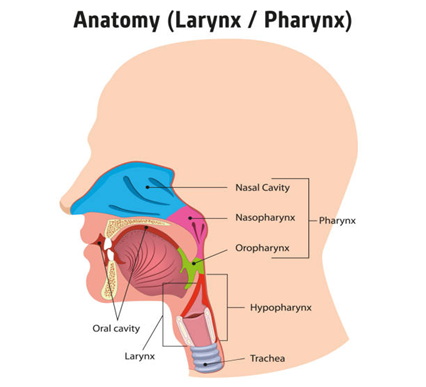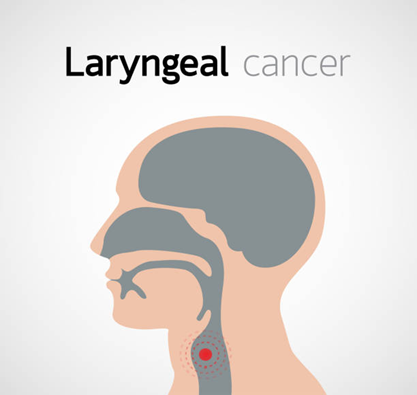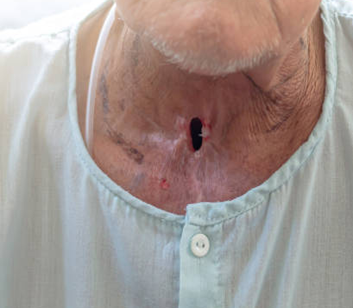Facing stage 3 laryngeal cancer can be overwhelming. However, being well-informed about your options and having expert guidance can make a significant difference. At this stage, the cancer has usually spread to nearby tissues or lymph nodes, resulting in severe symptoms and concerns about the most effective treatment and prognosis.
Dr. Devendra Chaukar, an esteemed head and neck oncologist in Mumbai, emphasizes the importance of prompt medical attention and personalized treatment plans to address this condition. Timely intervention can significantly improve the outcomes.
With over 20 years of experience, Dr Chaukar is a renowned specialist in laryngeal cancer treatment in Mumbai. He utilizes cutting-edge surgical techniques to ensure the best possible outcomes. Dr. Chaukar is known for his personalized and compassionate approach, tailoring care to meet each patient’s needs.
Laryngeal cancer progresses through various stages, each indicating the extent of the cancer’s spread. Understanding these stages is vital for appropriate treatment planning:
- Stage 0: Abnormal cells are found in the lining of the larynx but haven’t spread.
- Stage I: Cancer is confined to one part of the larynx, and the vocal cords still function normally.
- Stage II: Cancer has spread to another part of the larynx, but vocal cords are still functioning.
- Stage III: Cancer has spread to the lymph nodes or other areas around the larynx.
- Stage IV: Cancer has spread to distant parts of the body or extensively to surrounding tissues.

Quick Fact: Stage III laryngeal cancer often requires a combination of treatments, including surgery, radiation, and chemotherapy.
Stage 3 Laryngeal Cancer: How Long to Live?

The life expectancy for stage 3 laryngeal cancer varies based on several factors. These include the patient’s overall health, treatment response, and the tumor’s specific characteristics. While stage 3 indicates advanced cancer, many patients live for several years with proper treatment.
With advancements in medical technology and specialized care, many patients have the opportunity to live fulfilling lives despite their diagnosis. Regular follow-ups and a strong support system are vital for managing the condition and improving quality of life during and after stage 3 laryngeal cancer treatment. Patients should stay positive and adhere to treatment plans to achieve the best possible outcomes.
Concerned about your prognosis? Schedule an appointment with an experienced oncologist for a detailed assessment.
Is Stage 3 Laryngeal Cancer Curable?

While stage 3 laryngeal cancer is challenging to cure, it is not impossible. The goal is often to control the disease, reduce symptoms, and improve the patient’s quality of life. Stage 3 laryngeal cancer treatment plans typically involve a combination of surgery, radiation therapy, and chemotherapy.
Many patients achieve remission with early intervention and a comprehensive treatment plan. Continuous monitoring and post-treatment care are essential for maintaining good health and preventing recurrence.
Quick Fact: Multimodal treatment approaches increase the likelihood of successful management of stage 3 laryngeal cancer.
Stage 3 Laryngeal Cancer Treatment
“The main goal of treatment is to remove or destroy the cancerous cells, preserve the function of the larynx (voice box), and prevent the spread of cancer to other body parts,” mentions Dr. Devendra Chaukar, a well-known expert in laryngeal and hypopharyngeal cancer treatment in Mumbai.
The primary treatment options may include:
1. Surgery
Surgery is a common treatment for stage 3 laryngeal cancer. The type of surgery depends on the size and location of the tumor. The main surgical options include:
- Partial Laryngectomy:
In this procedure, the surgeon removes only a part of the larynx. It is suitable for tumors that are confined to a specific area. The goal is to remove the cancer while preserving as much of the larynx as possible to maintain normal speech and swallowing functions.
- Total Laryngectomy:
This involves removing the entire larynx, typically performed when the cancer is extensive. After this surgery, patients will need a tracheostomy, a permanent opening in the neck through which they breathe. Speech rehabilitation with a voice prosthesis or other speech aids is often necessary.
2. Radiation Therapy
It uses high-energy rays to target and kill cancer cells. Radiation therapy can be used as a primary treatment, especially in patients who are not suitable candidates for surgery, or as an adjuvant treatment after surgery to destroy any remaining cancer cells.
3. Chemotherapy
It involves using drugs to eliminate cancer cells. Chemotherapy is often combined with radiation therapy (chemoradiation) to improve treatment effectiveness.
4. Targeted Therapy
It involves drugs that target the unique characteristics of cancer cells, such as specific proteins or genetic mutations, without affecting normal cells.
5. Rehabilitation and Supportive Care
Following treatment, patients often need rehabilitation to regain speech and swallowing functions. Supportive care is also crucial to manage side effects and improve the quality of life. This includes:
- Speech Therapy: To help patients regain their ability to speak and communicate effectively after surgery.
- Nutritional Support: To ensure patients maintain adequate nutrition, especially if they have difficulty swallowing.
- Pain Management: To alleviate any pain or discomfort resulting from treatment.
The stage 3 laryngeal cancer treatment approach depends on the tumor’s size, location, and patient’s overall health. Personalized treatment plans aim to maximize effectiveness while minimizing side effects.
Seeking the best treatment options? Reach out to a specialist to explore your choices. Book your appointment now!
Concerned about the stage 3 laryngeal cancer survival rate? Let’s discuss the statistics.
Stage 3 Laryngeal Cancer Survival Rate

Survival rates for stage 3 laryngeal cancer depend on various factors, including the patient’s age, overall health, and response to treatment. On average, the five-year stage 3 laryngeal cancer survival rate is around 50-60%. Early detection and a comprehensive treatment plan tailored to the patient’s needs are crucial in improving survival rates.
Continuous follow-up care and lifestyle modifications also play a significant role in enhancing longevity and quality of life. Patients are encouraged to stay positive, follow their treatment plans diligently, and maintain regular follow-ups with their oncologist to achieve the best results.
Conclusion
While stage 3 laryngeal cancer is a severe diagnosis, many patients achieve positive outcomes with the right combination of advanced, personalized treatments and consistent medical follow-ups.
With the expertise of specialists like Dr. Devendra Chaukar, patients can receive tailored care that enhances their quality of life and survival rates. Maintaining an optimistic outlook and adhering to treatment plans are essential for the best results.
Frequently Asked Questions:
What is the life expectancy of laryngeal cancer?
What are the early signs of larynx cancer?
What is the recovery time after laryngeal cancer treatment?
Are there any side effects of laryngeal cancer treatment?
How does laryngeal cancer affect the voice?
What is the recurrence rate for laryngeal cancer?
Can laryngeal cancer spread to other body parts?

Dr Devendra Chaukar
Dr. Devendra Chaukar is a renowned Head and Neck Surgical Oncologist with over 20 years of experience in treating complex head and neck cancers. A graduate of Tata Memorial Hospital, Mumbai, he specializes in minimally invasive surgeries and organ-preserving treatments. Dr. Chaukar is deeply committed to patient-centric care and advancing cancer treatment through research and education.






Recent Comments